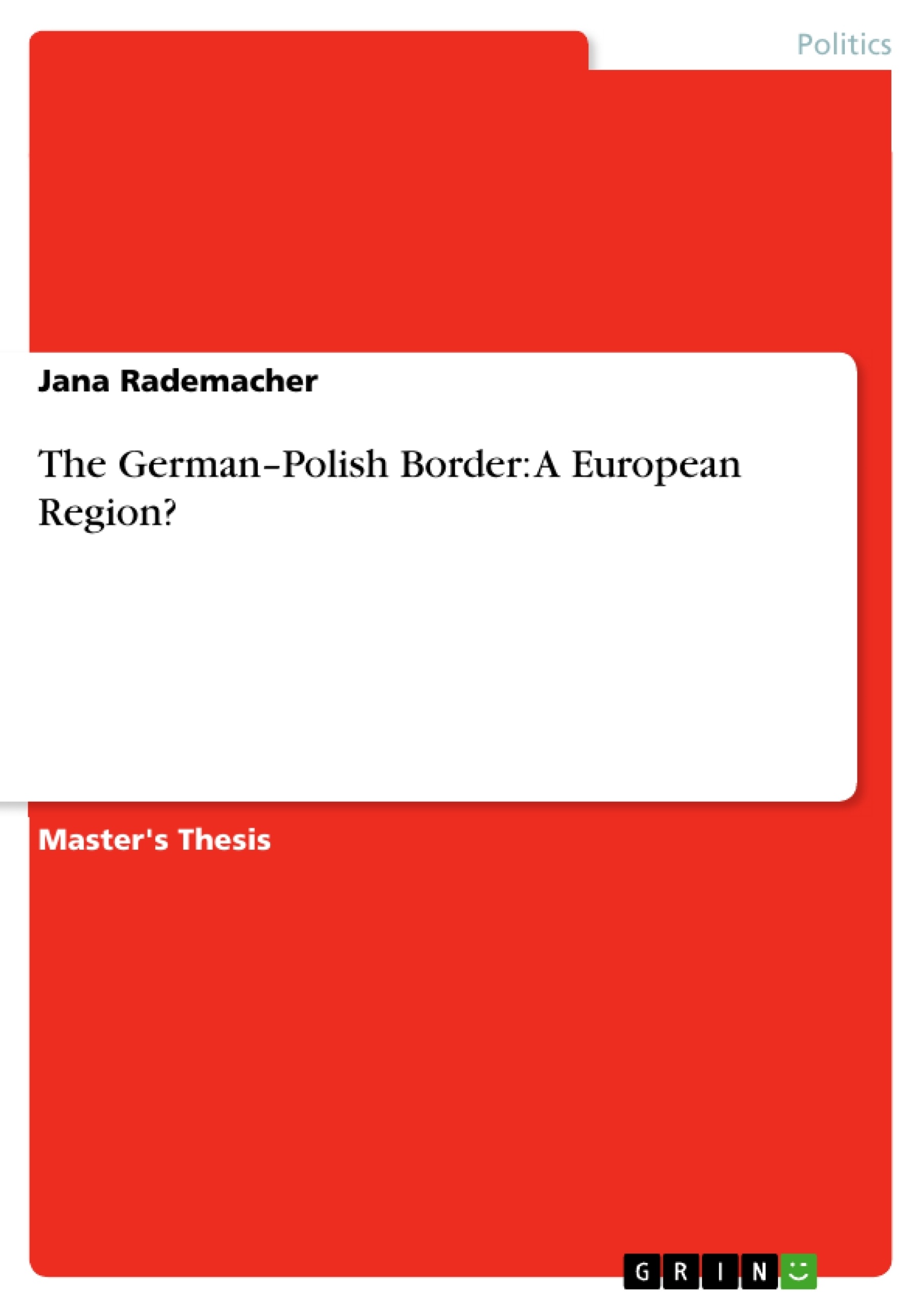The paper deals with the subject matter of the German–Polish border region and its implications for Poland’s integration into the European Union. The research question is: Is the German–Polish border region (along the River Oder) a European region? This also implies the question whether Poland is fully integrated into the European Union. To answer the question, this paper deals with the importance, which political and cultural relations with Germany have for Poland’s integration into the EU. The paper will attempt to demonstrate the connection between cultural exchange and political relations. In the course of the analysis the significance of stereotypes and prejudices formed by historical events and circumstances is being analised. The focus is on the endeavours undertaken by Polish and German governments, civil society organisations and cultural institutions to make a difference concerning the complicated historical and political situation regarding the EU enlargement and Poland’s accession.
Table of Contents
- Introduction
- Historical overview of the German-Polish relations
- The meaning of borders
- Reconciliation and actual state of society
- The Oder region and its society
- Civil societies in Germany and Poland
- Cultural cooperation
- Büro Kopernikus
- The Oder project
- results and experience
- The Oder-border river and cultural space
- Space of remembrance
- Benefits of regional cooperation and Regionalism
- The EU enlargement and European integration
- Common ground
- Integration process
- Analysis of the EU integration process
- Recommendations
Objectives and Key Themes
This paper explores the question of whether the German-Polish border region along the River Oder can be considered a European region, considering Poland's integration into the European Union. The paper aims to demonstrate the connection between cultural exchange and political relations, analyzing the role of historical events, stereotypes, and prejudices in shaping these dynamics. The focus is on the efforts of Polish and German governments, civil society organizations, and cultural institutions in fostering a more harmonious relationship in the context of EU enlargement and Poland's accession. Key themes explored in this paper include: * The impact of historical events and tensions on contemporary German-Polish relations * The role of cultural exchange and cooperation in building bridges between the two countries * The significance of civil society in promoting cross-border dialogue and understanding * The potential for the Oder region to serve as a model for regional cooperation and integration within the EU * The influence of EU enlargement and integration on the relationship between Germany and PolandChapter Summaries
This paper examines the German-Polish border region and its implications for Poland's integration into the European Union. The research question is whether this region can be considered a European region, which also implies whether Poland is fully integrated into the EU. The paper focuses on the importance of political and cultural relations with Germany for Poland's integration into the EU, attempting to demonstrate the connection between cultural exchange and political relations. The analysis considers the significance of stereotypes and prejudices formed by historical events and circumstances, with a focus on the endeavors undertaken by Polish and German governments, civil society organizations, and cultural institutions to address the complicated historical and political situation regarding the EU enlargement and Poland's accession. The paper begins by providing historical background information on the German-Polish relationship, highlighting its history of conflict, oppression, war, and political isolation. The influence of 20th-century events on the contemporary relationship between the two neighboring states is examined. The paper then delves into the meaning of a region, a border region, and what a border implies for the citizens of a state. The Oder-Neiße border, deprived of its cultural roots, is analyzed in the context of its slow formation of new ties. The paper explores the socio-cultural structure of the area, which was totally changed by the developments after WWII, and how the alienation of the two nations became even greater during the Cold War. The paper further examines the meaning of civil society, its actions, and attitudes towards cultural exchange, as well as the political atmosphere surrounding it. The importance of an engaged civil society for strong bilateral exchange is highlighted, exploring the level of interest in cultural exchange with the respective other country and the efforts undertaken in the past. The paper then delves into the cooperation in the cultural field, focusing on a specific cultural project to illustrate the possibilities and capacities of cultural cooperation. The bodies of cultural funding in Germany that have supported many projects are also illuminated. The chosen project, "Odra - Oder," is set in the border region. The paper continues by presenting the significance of the Oder as a cultural space and a defined political border. It explores the role of the river as a border river and the scope of influence that historical, political, and cultural aspects have on shaping today's border culture. The paper analyzes the benefits of regional cooperation and presents the principles of EU enlargement and integration, exploring what it means for the relationship between Germany and Poland. Finally, the paper analyzes the situation in the Oder-region and provides recommendations for the improvement of integration and regional cooperation. It also explores the potential of the region to function as an integrative motor for Poland's integration into the EU. The paper concludes by attempting to assess the progress made in creating a European border region along the Oder.Keywords
This paper focuses on the dynamics of the German-Polish border region, particularly in the context of Poland's integration into the European Union. Key themes include: * German-Polish relations * Cultural exchange * Regional cooperation * EU enlargement and integration * Border region * Civil society * Historical events * Stereotypes * Prejudices * Oder River * European identity- Quote paper
- Jana Rademacher (Author), 2012, The German–Polish Border: A European Region?, Munich, GRIN Verlag, https://www.grin.com/document/231380




